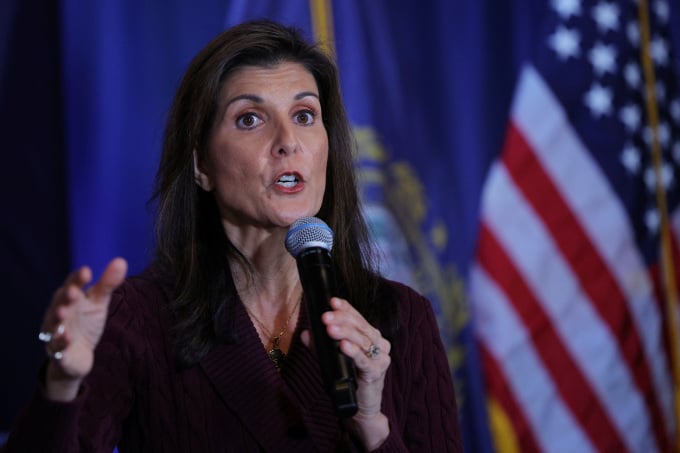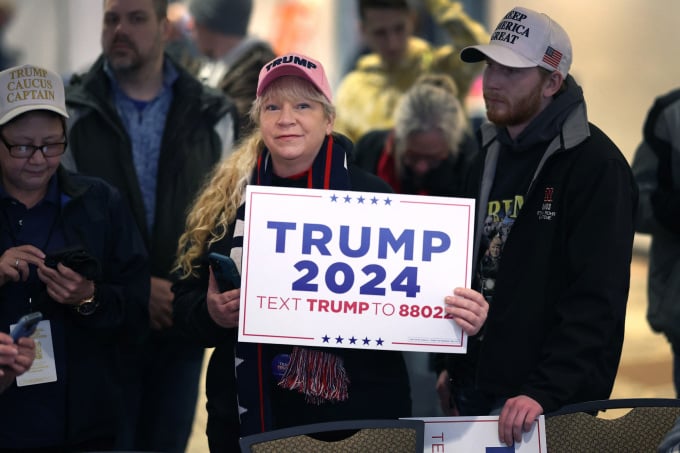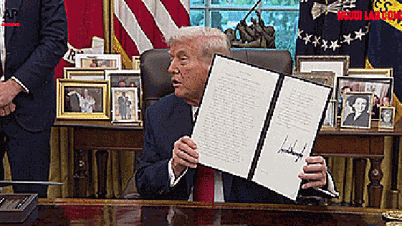Nikki Haley, Donald Trump's opponent in the Republican primary, lost more than she gained when Ron DeSantis dropped out.
Supporters of Nikki Haley, the former US ambassador to the United Nations, cheered during a campaign rally in New Hampshire on January 21, after she announced that Florida Governor Ron DeSantis was dropping out of the White House race.
However, the 52-year-old politician herself may not be too happy. She understands that the two-horse race between her and former President Donald Trump is getting more difficult. Ron DeSantis not only announced his withdrawal, but also publicly supported Mr. Trump.
"DeSantis's withdrawal from the race has eliminated Haley's chance to keep Trump's approval rating below 50%," said Mike Dennehy, a Republican election strategist in New Hampshire.
Dennehy, who worked on the 2000 and 2008 presidential campaigns of the late Senator John McCain, predicted that Mr. Trump has a chance to win about 60% of support in the vote in New Hampshire on January 23.

Nikki Haley, former US ambassador to the United Nations, speaks to Republican voters on January 18 ahead of the New Hampshire primary. Photo: Reuters
For Trump’s primary opponents, New Hampshire has long been considered the “battleground” where they have the best chance of blocking the former president. Among the early voting states, this is the only place where Trump has not won a majority of support during the months of campaigning in 2023. New Hampshire voters tend to vote for candidates with more moderate and moderate positions.
Polls over the past few months have shown Haley has the majority of independent voters planning to vote on January 23rd and 71% of moderate voters. She also leads Trump among white-collar voters by 50%, while the former president has 38%, according to a CNN/University of New Hampshire (UNH) poll. However, all three groups make up a minority of the state’s Republican electorate.
Mr. Trump still leads in New Hampshire, despite not having broken the 50% threshold for months. His platform is his overwhelming influence among Republican loyalists, conservative voters and voters without college degrees.
In a UNH poll in early January, Trump led Haley by 39% to 32%. However, the race has continued to turn against the former US ambassador.
After Mr. Trump won overwhelmingly in Iowa, the opening state of the primary election, every survey in the past week in New Hampshire showed that he had a chance to surpass the 50% mark of the vote. A series of Trump's opponents in the primary election dropped out one after another and announced their support for the former president to represent the party. First was Indian-origin billionaire Vivek Ramaswamy, then Senator Tim Scott of South Carolina and now Florida Governor Ron DeSantis.
Each candidate’s exit from the race has been a boost to Mr. Trump’s campaign and narrowed Ms. Haley’s field. While both candidates have received increased support from their former opponents’ constituencies, many voters still favored Mr. Trump over Ms. Haley when they switched sides.
Matthew Bartlett, a Republican strategist in New Hampshire, said DeSantis poses a bigger challenge to Haley when he drops out than when he ran. The Florida governor's support in the New Hampshire primary is expected to fall to around 6%, as he focuses more resources on his South Carolina battleground.
"The situation may have changed. The Trump team is thinking they can 'kill' Ms. Haley's campaign in New Hampshire, where she still has the potential to threaten the former president's ambitions, then return to the MAGA states with overwhelming advantages," Bartlett said, referring to Trump's loyal voters and the slogan "Make America Great Again".

Supporters wait to attend Donald Trump's campaign rally in Sioux Center, Iowa on January 5. Photo: AFP
DeSantis's base of voters, who lean conservative, aligns more closely with Mr Trump's positions than Ms Haley's.
According to a survey by UNH and CNN on January 21, more than 60% of DeSantis supporters see Mr. Trump as a backup option if their candidate drops out, while 30% said they would switch to supporting Haley. A survey by Sufolk University, Boston Globe, and NBC10 Boston found that 57% of DeSantis voters were willing to support Trump, while Haley's support stood at 33%.
"In a two-horse race, a candidate who wants to show that he will surely win the election needs to achieve an overwhelming majority of more than 50% of the vote. Mr. Trump has a very good chance of achieving this milestone," said David Paleologos, director of the voter survey center at Sullofk University.
Despite many negative predictions, former ambassador Nikki Haley and her team remain optimistic about the upcoming New Hampshire election. Members of Haley's campaign committee initially identified the primary as essentially a two-horse race between her and the former US president, before the list of candidates narrowed in recent months.
After receiving news of DeSantis' withdrawal, Haley continued to issue a statement calling on voters to switch their support to her if they truly wanted "a new generation of leadership" and a politician who walks the talk.
"In America, there is no 'obvious winner'. Voters have the right to decide whether the country will go down the path of Mr. Trump or Mr. Biden, or whether we will go down a new political path together," Haley emphasized.
Thanh Danh (According to Politico, CNN )
Source link


![[Photo] Panorama of the cable-stayed bridge, the final bottleneck of the Ben Luc-Long Thanh expressway](https://vphoto.vietnam.vn/thumb/1200x675/vietnam/resource/IMAGE/2025/9/30/391fdf21025541d6b2f092e49a17243f)
![[Photo] General Secretary To Lam, Secretary of the Central Military Commission attends the 12th Party Congress of the Army](https://vphoto.vietnam.vn/thumb/1200x675/vietnam/resource/IMAGE/2025/9/30/9b63aaa37ddb472ead84e3870a8ae825)
![[Photo] Solemn opening of the 12th Military Party Congress for the 2025-2030 term](https://vphoto.vietnam.vn/thumb/1200x675/vietnam/resource/IMAGE/2025/9/30/2cd383b3130d41a1a4b5ace0d5eb989d)

![[Photo] The 1st Congress of Phu Tho Provincial Party Committee, term 2025-2030](https://vphoto.vietnam.vn/thumb/1200x675/vietnam/resource/IMAGE/2025/9/30/1507da06216649bba8a1ce6251816820)
![[Photo] President Luong Cuong receives President of the Cuban National Assembly Esteban Lazo Hernandez](https://vphoto.vietnam.vn/thumb/1200x675/vietnam/resource/IMAGE/2025/9/30/4d38932911c24f6ea1936252bd5427fa)


































































































Comment (0)